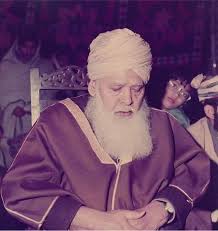Ahmad Saeed Kazmi
This article does not cite any sources. (November 2015) |

Syed Ahmad Saeed Kazmi (1913 – 4 June 1986, Urdu: سید احمد سعید کاظمی) was an Islamic scholar and Sufi living in Multan. He is known for his contribution to the Pakistan Movement, Urdu translation and explanation (Tafseer) of Quran, and Dars-e-Hadith. His tomb sits next to Multan's 18th century Shahi Eid Gah Mosque.
Education[]
Kazmi was six years old when his father died at the age of 39.[citation needed] Therefore, his eldest brother Muhammad Khalil Kazmi raised him. His mother initiated his education. His uncle later gave him Sanad-e-Hadith and Sufist education.[citation needed]
- Books
- Meelaad un Nabi (صلى الله عليه وسلم)
- Noor e Mustafa
- Tauheed aur Shirk
- Gustaakh e Rasool ki Saza
- Ahle Bayt e At’haar par Mustaqilan Salaam ka Jawaaz
- Haq-ul-Mubeen
- Irfaan e Rabbaani ki naatiq daleel
- Mas’ala-e-Imtina-e-Nazeer
- Al Tibyan ul azeem fee Tafseer Surah at-Tahreem
- Al-Bayaan (Qur’an majeed ka Urdu Tarjuma)
- Nabuwwat o Risaalat
- Isbat-ul-Sama
- Zambik ka ma’ani aur Mas’ala e Durood
- Islaam me aurat ki diyyat
- Hayaat-ul-Nabi (Hazrat Imaam Jalaal-ud-deen Suyuti rahmatullāhi alaihi ki kitaab ka tarjuma)
- Maqaalaat (مقالات کاظمی) o Khutbaat-e-Kaazmi (رحمت اللہ علیہ).
Migration to Multan[]
Nafir Alam was a Sufi saint who used to celebrate the urs of Khawja Moin-ud-Din Chishti Ajmeri in Multan. He invited young Ahmad Saeed to debate in Multan.[citation needed] When he listened to his speech, he was impressed. So he continuously requested Ahmad Saeed to permanently shift to Multan. Therefore, Kazmi migrated to Multan in the early 1935.[citation needed]
In Multan, Kazmi started teaching in his own home near Tinan Wali Khoi. In November 1935 he started giving lectures in Masjid Hafiz Fateh Sher Outside Lohari Gate, which continued for 18 years. After that He started Dars-e-Hadith in Chup Shah's Mosque and completed Mishkat al-Masabih followed by Sahih al-Bukhari.[citation needed]
In that era, Muslims of India were demanding independence and their major party was Muslim League. Ahmad Saeed was impressed by the Muslim League's program therefore he joined. In the area of Southern Punjab, he worked to spread political awareness among Muslims and to bring them to the platform of Muslim League. He never met with Muhammad Ali Jinnah, yet he was connected with him through mail.[citation needed]
On the request of nawab of Bahawalpur and nawab of Kalabagh Hazoor Ghazali e zaman[clarification needed] accepted the post of Shaikh ul Hadith in Islamia university of Bahawalpur, and he taught there for long time.[citation needed]
Sons[]
- Mazhar Saeed Kazmi (Sajjaada Nasheen)
- Sajjaad Saeed Kazmi
- Haamid Saeed Kazmi
- Dr.Rasheed Saeed Kazmi
- Arshad Saeed Kazmi
- Tahir Saeed Kazmi.
Madrasa Anwar-Al-Uloom[]
He founded Madrasa Arabia Anwar-ul-Uloom in 1943 (1362 hijri), situated near Chowk Kumharanwala Multan. This Islamic schools is providing higher education including Dars-e-Hadith, Dars-e-Nizami, Hifz, Tajveed, etc. Its degrees are equivalent to Bachelors and Masters degrees. A hostel is attached where poor and needy students live free of cost. Madarsa Arbia Anwar ul uloom was initially in muahallah qadeer abad. And it was stated there till early 1990. and because of the large number of students, a piece of land was purchased in new multan. and then madarsah was transferred to this new place. Now his elder son Sahibzada SyedMazher Saeed Kazmi is serving as Mohtamim. His son Sahibzada Syed Arshed Saeed Kazmiis serving as Shaikh-ul-Hadis..he never wrote his name Al-Husyni.the spelling of his name isSyed Ahmed Saeed Kazmi
See also[]
- Dargah-e-Ala Hazrat
- Mustafa Raza Khan Qadri
- Hamid Raza Khan
- Syed Shujaat Ali Qadri
- Ilyas Qadri
- Jamaat Ahle Sunnat
- Muhammad Muslehuddin Siddiqui
- Syed Waheed Ashraf
External links[]
 Media related to Ahmad Saeed Kazmi at Wikimedia Commons
Media related to Ahmad Saeed Kazmi at Wikimedia Commons- Audio Files
- Books by Kazmi at Kazmis.com
- 1913 births
- 1985 deaths
- 20th-century Muslim scholars of Islam
- Pakistani Sufis
- People from Amroha district
- Pakistani Sunni Muslims
- Muhajir people
- People from Multan
- Jamiat Ulema-e-Pakistan politicians
- Punjabi Sufis
- Translators of the Quran into Urdu
- Barelvis
- Pakistani people of Arab descent
- 20th-century translators
